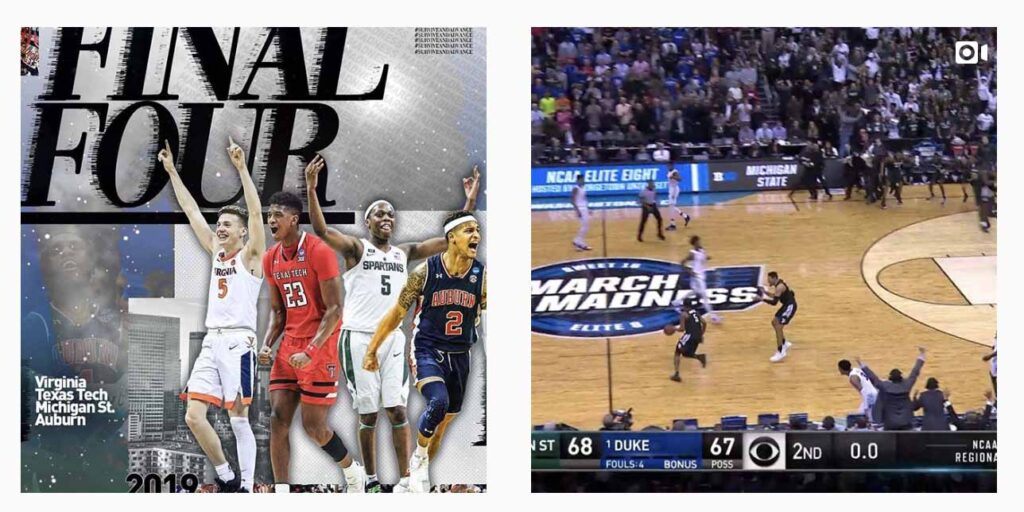During March the NCAA was busy with two things: hosting the March Madness® Tournament, and enforcing the March Madness® trademark against unauthorized infringers as sports trademarks and branding take center stage during the tournament and leading into the 2020 Summer Olympics in Tokyo. The NCAA’s Trademark Protection Program and enforcement actions indicate that the association remains vigilant and vigorous in the protection of their trademarks. Entrepreneurs, technology startups and business owners should exercise caution if seeking to use the NCAA’s marks, or other sports trademarks, and those confusingly similar thereto or likely to cause customer confusion, in connection with own promotional or marketing endeavors.
The NCAA owns over seventy trademarks, the most well known of these marks being MARCH MADNESS® and FINAL FOUR®. The term MARCH MADNESS ® is a federally registered trademark on the United States Patent and Trademark Office (USPTO) under Registration No. 1571340 with a priority date of March 10, 1986. FINAL FOUR® is also a federally registered trademark on the USPTO under Registration No. 1488836 with a 1977 priority date. Both marks are filed in International Class 041 for entertainment services and conducting annual basketball tournaments at the college level.
In an effort to protect these marks, the NCAA has issued their Trademark Protection Plan indicating that the association must grant approval before the use of any NCAA trademark, including logos. While not limited to these instances, the protection plan explicitly prohibits unauthorized use of NCAA’s marks for advertising, marketing, sweepstakes, contests, or in domain names. Furthermore, the protection plan prohibits the use of commercial identification within an NCAA championship bracket. If authorization to use a mark is obtained, licensees must still be diligent to comply with extensive guidelines such as how and where the marks may appear and what legal statements or TM notices must accompany the marks.
The NCAA is extremely active in policing and enforcing these trademark rights and these enforcement efforts are not limited to sporting games and events but span across industries from travel to adult entertainment. Furthermore, those seeking to utilize the March Madness® phenomenon, may still be subject to liability when using marks that are too similar to the NCAA’s marks. This was recently illustrated when the NCAA was awarded a permanent injunction against a sweepstakes provider using the marks, APRIL MADNESS and FINAL THREE.
If a third party seeks to use the MARCH MADNESS® or FINALFOUR® marks, a license or authorization from the NCAA will most likely be necessary to avoid a claim trademark infringement. However, there may be circumstances that can allow an unauthorized party to make “fair use” of the marks. Nominative fair use requires that:
- The use must not imply endorsement or sponsorship
- The use of the trademark is not more than is necessary
- The references to the trademark, the products, or the owner are accurate
- There is no other way to refer to a trademark owner or its products
Common instances of nominative fair use include comparative advertising, parody and noncommercial use of trademarks in academic articles or news reports.
Business owners should proceed cautiously with regard to the NCAA’s marks, as an infringement claim can result in a costly judgement or defense team. Best practices should include consultation with a trademark and advertising attorney that can help evaluate your use of the marks and provide you with a risk analysis on your intended use. An experienced trademark attorney can also assist you with obtaining licensing agreements, should one be necessary.

Author: David N. Sharifi, Esq. is a Los Angeles based intellectual property attorney and technology startup consultant with focuses in entertainment law, emerging technologies, trademark protection, and “the internet of things”. David was recognized as one of the Top 30 Most Influential Attorneys in Digital Media and E-Commerce Law by the Los Angeles Business Journal in 2014. Office: Ph: 310-751-0181; david@latml.com.
Disclaimer: The content above is a discussion of legal issues and general information; it does not constitute legal advice and should not be used as such without seeking professional legal counsel. Reading the content above does not create an attorney-client relationship. All trademarks are the property of L.A. Tech & Media Law Firm or their respective owners. Copyright 2019. All rights reserved.


